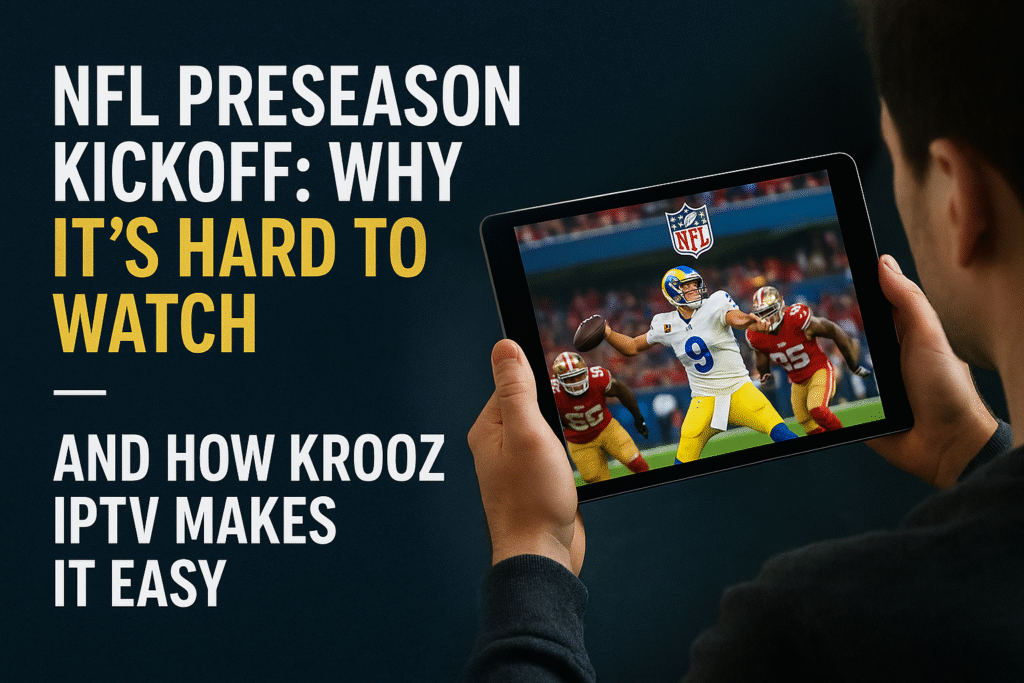Introduction: The Digital TV Revolution
Remember the last time you endlessly flipped through cable channels only to find nothing to watch? Those days are quickly fading. In today’s digital age, traditional television is being transformed by streaming services and on-demand content. At the heart of this shift is IPTV — Internet Protocol Television — a new way of delivering television content through the internet.
Whether you’re a binge-watcher, a sports fanatic, or someone looking for international content, IPTV offers an exciting and flexible alternative to outdated cable packages. In this blog post, we’ll explore what IPTV is, how it works, its various types, benefits, limitations, and what you need to know to get started. Along the way, we’ll also mention popular IPTV services like Krooz TV that are reshaping the viewing experience.
What is IPTV? Breaking Down the Basics
IPTV stands for Internet Protocol Television. Unlike traditional methods like cable or satellite TV, IPTV delivers television content using the internet. That means no satellite dishes or coaxial cables — just a reliable internet connection.
Instead of broadcasting a variety of programs on set schedules, IPTV allows users to stream media in a more personalized, flexible way. In simple terms, it’s similar to how services like Netflix or YouTube deliver video content, but IPTV often includes live channels, on-demand movies, and even interactive features.
How IPTV Works: A Simplified Tech Breakdown
The technology behind IPTV might sound complicated, but it’s actually quite intuitive. Here’s a simplified explanation:
- Content from broadcasters or providers is sent to centralized servers.
- The content is encoded and compressed for internet delivery.
- Users request content via apps, set-top boxes, or smart TVs.
- The requested video stream is delivered through your internet connection in real-time.
This iptv system enables a smoother, more customizable experience. High-quality streaming (up to 4K), pausing live TV, and on-demand access are just some of the features IPTV offers.
Types of IPTV Services
There are three main types of IPTV services:
1. Live TV (Live Broadcast IPTV)
This functions like traditional live TV — think of watching live news, sports, or events — but streamed over the internet.
2. Video on Demand (VOD)
This feature allows users to watch movies, shows, or other content from a library, anytime they want. It’s essentially Netflix-style access to a broader range of genres and content providers.
3. Time-Shifted Media
This lets users replay or catch up on previously aired programs. Missed last night’s game or episode? Time-shifted IPTV lets you rewind and view past broadcasts at your convenience.
IPTV Delivery Formats and Devices
One of IPTV’s major strengths is its compatibility across various devices and platforms:
- Set-top boxes (e.g., MAG boxes, Android boxes)
- Smart TVs (Samsung, LG, etc.)
- Streaming devices (Amazon Fire Stick, Roku)
- Mobile apps (iOS and Android)
- Web browsers on laptops or desktops
For example, services like Krooz TV offer seamless streaming across smartphones, tablets, and smart TVs without any additional hardware.
Legal and Illegal IPTV: Know the Difference
Not all IPTV services are created equal. Understanding the legality of IPTV is crucial:
- Legal IPTV: These providers have the proper licenses to broadcast content. They charge subscription fees and maintain compliance with broadcasting regulations.
- Illegal IPTV: These services offer channels and content without proper rights, often at very low prices.
Risks of illegal IPTV include:
- Malware and viruses
- Service interruptions
- Legal consequences (both for sellers and users)
Before choosing a provider, always check if the service is operating within legal parameters.
Advantages of IPTV
Here are some of the most compelling benefits of IPTV:
- Vast Content Access: International channels, live sports, regional content, and niche shows.
- Anytime, Anywhere: Stream on any device with internet access.
- Custom Experience: Choose your content and create a personal watchlist.
- Interactive Features: Vote, comment, or participate in real-time shows.
- Cost Savings: Often cheaper than cable subscriptions with more content flexibility.
Challenges and Limitations of IPTV
Despite its many advantages, IPTV is not without challenges:
- Internet Dependence: Requires stable high-speed internet (preferably fiber or 4G/5G).
- Latency Issues: Live broadcasts may lag depending on server speed.
- Service Reliability: Cheaper providers may cut corners, affecting uptime and content delivery.
- Geo-blocking: Some content may be restricted by region.
How to Choose the Right IPTV Service
To avoid disappointment, consider these factors when selecting an IPTV provider:
- Content Catalog: Does it offer the channels and genres you need?
- Streaming Quality: Are HD and 4K options available?
- Customer Support: Reliable support is key for troubleshooting.
- Compatibility: Ensure the service works with your devices.
- Trial Period: Look for free trials or short-term plans before committing.
Services like Krooz IPTV score highly in many of these areas and are known for transparent pricing and stable service.
IPTV and User Privacy: What You Should Know
Streaming over the internet raises valid privacy concerns:
- Always use strong passwords and secure apps.
- Consider using a VPN to encrypt your traffic and bypass regional restrictions.
- Check if your IPTV provider has a privacy policy regarding data collection and storage.
The Future of IPTV: What’s Next?
IPTV continues to evolve rapidly, and the future looks promising:
- 5G Rollout: Faster internet will improve stream quality and accessibility.
- AI-Powered Recommendations: Smarter content suggestions based on behavior.
- Smart Home Integration: Control IPTV with voice assistants and automation.
- Global Accessibility: Cross-border streaming without restrictions.
IPTV vs. Other Streaming Services (Netflix, Hulu, etc.)
Here’s how IPTV compares with traditional streaming services:
| Feature | IPTV | Netflix/Hulu/etc. |
|---|---|---|
| Live Channels | Yes | No |
| On-Demand Content | Yes | Yes |
| Device Compatibility | High | High |
| Regional Content | Global | Region-specific |
| Custom Plans | Often flexible | Less customizable |
While platforms like Netflix are excellent for series and movies, IPTV is a better option for live events and regional content.
IPTV for Businesses and Enterprises
IPTV isn’t just for homes. Businesses use IPTV to enhance communication and engagement:
- Hotels: Offer guest room entertainment and local content.
- Hospitals: Provide information and entertainment to patients.
- Offices: Use for digital signage, announcements, and training.
Common Questions About IPTV (Mini-FAQ)
Is IPTV legal in my country? It depends on licensing. Always verify that the provider holds proper distribution rights.
Do I need a VPN? A VPN is recommended for privacy and accessing geo-blocked content.
What internet speed is required? At least 10 Mbps for HD, 25+ Mbps for 4K streaming.
Can I record IPTV shows? Yes, many services allow DVR-like recording or replay features.
What if my IPTV stops working? Check your internet connection and provider status. Use providers with reliable support.
Conclusion: Embracing the IPTV Evolution
IPTV represents a significant shift in how we consume television. Offering more flexibility, broader content access, and cost savings, it’s no surprise IPTV is gaining ground worldwide. Whether you’re cutting the cord or exploring new content, IPTV provides an engaging and modern way to watch TV.
As the technology matures and internet infrastructure improves, IPTV is poised to become the new standard. Now is the perfect time to explore and experience what this dynamic platform has to offer.


